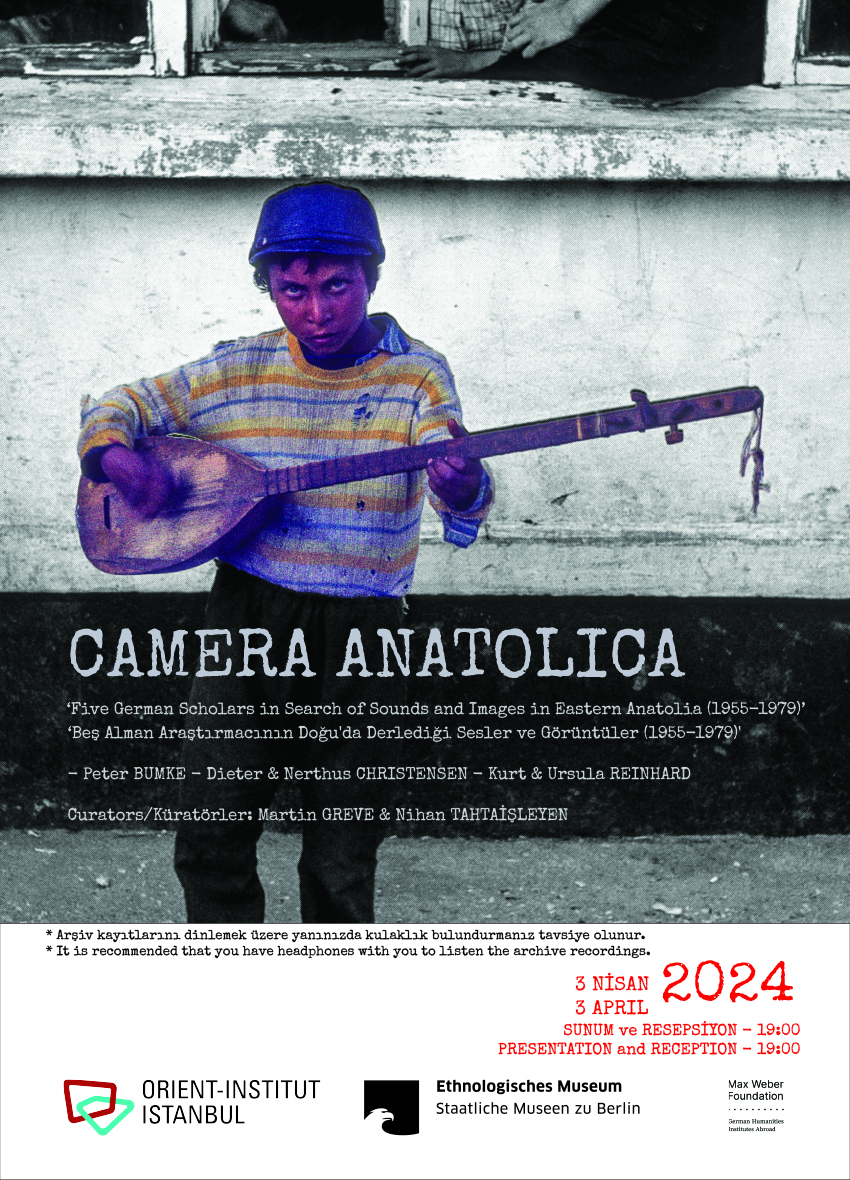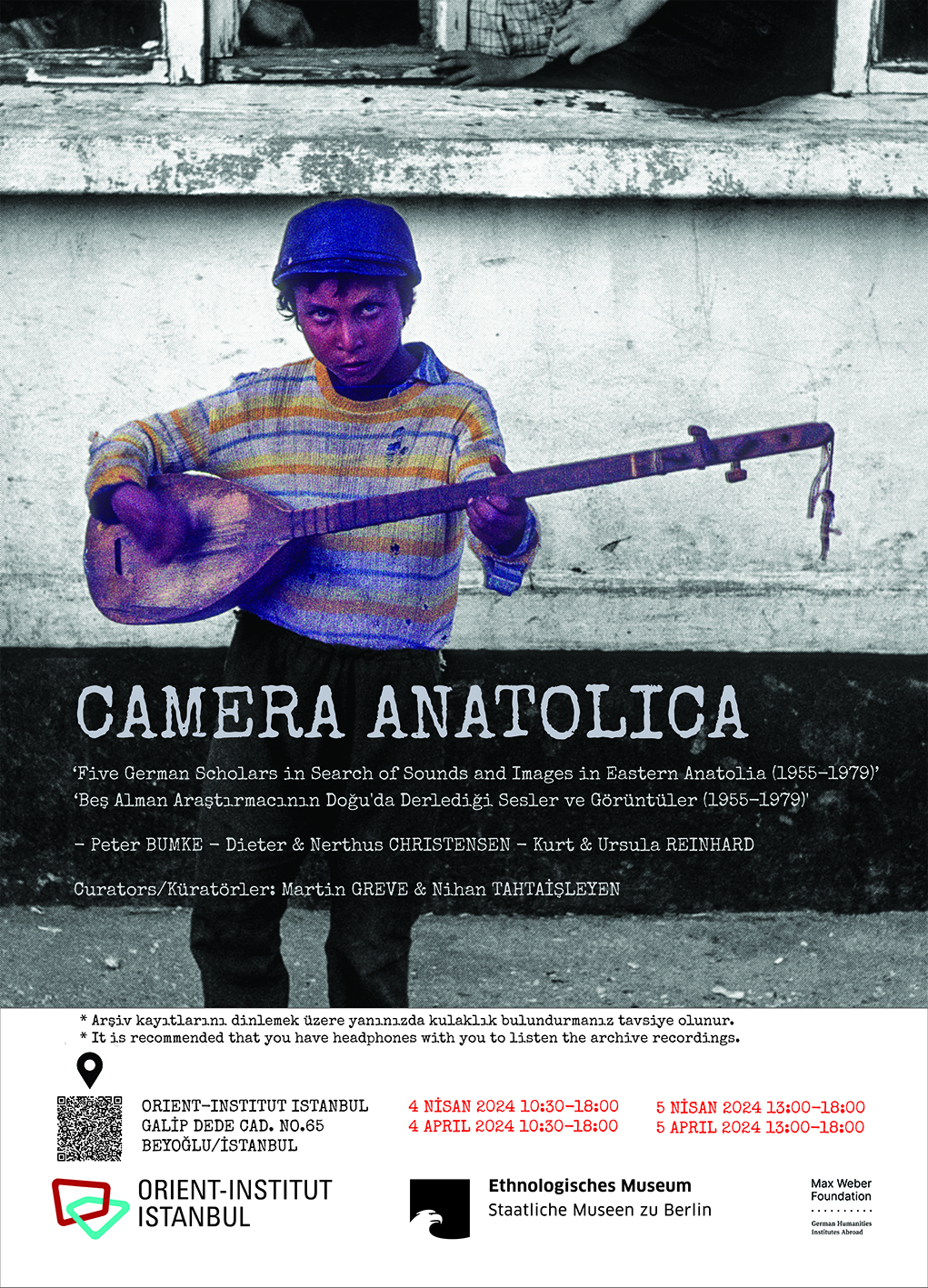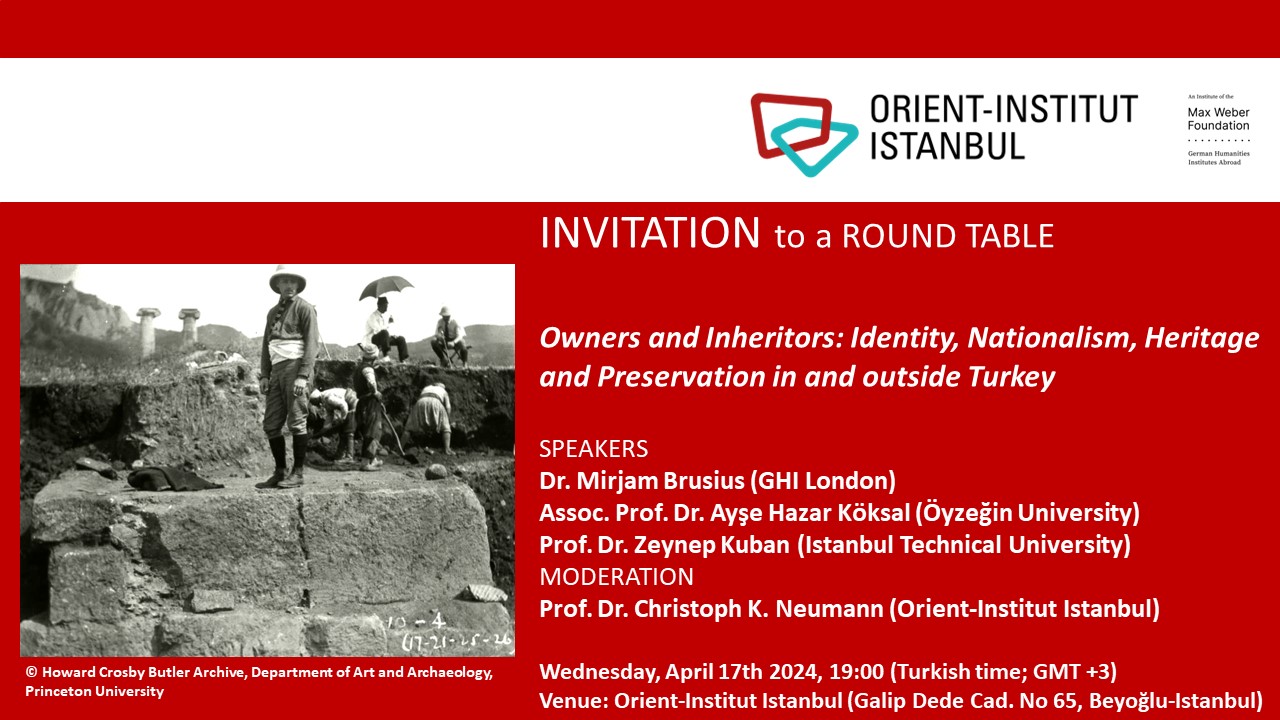April, 2024
Details
Sergi DAVETİYESİ Camera Anatolıca Sunum ve Resepsiyon 3 Nisan 2024 19:00 Orient-Institut Istanbul Galİp Dede Cad.
Details
Sergi DAVETİYESİ
Camera Anatolıca
Sunum ve Resepsiyon
3 Nisan 2024 19:00 Orient-Institut Istanbul
Galİp Dede Cad. 65, Şahkulu Mah., Beyoğlu, Istanbul
Camera Anatolıca
Beş Alman Araştırmacının Doğu’da Derlediği Sesler ve Görüntüler (1955-1979)
Sergi,1950’lerden 1970’lere kadar Doğu Anadolu’nun çeşitli bölgelerinde araştırmalar yapan beş Alman etnomüzikolog / etnoloğun fotoğraf, kayıt ve başkaca arşiv malzemelerinden bir seçki sunuyor:
– Kurt Reinhard (1914-1979) ve Ursula Reinhard (1915-2006)
– Dieter Christensen (1932-2017) ve Nerthus Christensen (1932-2003)
– Peter Bumke (d. 1951)
Reinhardlar onlarca yıl boyunca Türk müziği üzerine uluslararası araştırmalara öncülük ederken, Christensen Kürt müziği üzerine çalışan ilk uluslararası araştırmacı olarak kabul edilmektedir. Bumke, Kürt topluluklarının yaşamlarına odaklandığı uzun yıllar süren çalışmalarının ardından akademik kariyerini bırakarak uluslararası kültürel arabuluculuğa yöneldi.
Beşi de Doğu’nun farklı bölgelerine kapsamlı araştırma gezileri düzenleyerek fotoğraflar çekti ve müzik kayıtları yaptı. Reinhardlar Adana, Gaziantep, Hatay (Antakya), Malatya, Sivas ve Ursula Reinhard özelinde Kars’a; Christensenler ise Siirt ve Hakkâri’ye gittiler. Peter Bumke 1970’lerde, o zamanlar Avrupa’da pek tanınmayan Dersim/Tunceli’de çalıştı. Araştırmacıların çalışmalarını saha araştırması bulguları üzerine yaptıkları kapsamlı yayınlar ve etnografik müzik albümleri aracılığıyla izlemek mümkün. Ancak bu çalışmalara dair fotoğraflar unutulmuştu ve bu sergide ilk kez gösteriliyor. Reinhard ve Christensen’e ait fotoğraf, müzik kaydı ve diğer belgeler şu anda Berlin Etnoloji Müzesi’nde (Berlin Devlet Müzelerinden biri) ve Peter Bumke’ninkiler onun şahsi arşivinde muhafaza edilmektedir. Fotoğraflar, Kürt ve Türk köylerinin bugün kaybolmuş dünyasını sunarken, orijinal müzik kayıtları da zamanı yeniden duyulabilir kılıyor. Fotoğraflara eşlik eden diğer arşiv belgeleri, araştırmacıların çalışma yöntemleri hakkında fikir veriyor ve izleyiciye bir tür arşiv araştırmacısı deneyimi yaşatıyor. Sergide Peter Bumke’nin kırk yıl sonra araştırma yaptığı kişilerle temasa geçerek onların hayatları üzerine yaptığı röportajlar da sunuluyor.
Serginin her bir bölümüyle bağlantılı 37, 41 ve 42 numaralı Pera Blätter yayınlarına ulaşmak için bu bağlantıya tıklayın Pera-Blätter– Orient-Institut Istanbul (oiist.org)
Sergideki arşiv kayıtlarını dinlemek için kulaklık getirmenizi öneririz.
Etkinlik esnasında fotoğraf ve video çekilecektir. Etkinliğe katılan konuklar, çekilen fotoğrafların/videoların Orient-Institut Istanbul tarafından kullanılmasını, resmi websitesi ile Facebook, Instagram ve Twitter sayfalarında yayınlanmasını peşinen kabul ederler.
Sergi 4 Nisan10:30 – 18:00 ve 5 Nisan 13:00 – 18:00 saatleri arasında ziyarete açıktır ve kayıt gerekmemektedir.
3 Nisan 19:00’daki sunum ve resepsiyona katılmak için 2 Nisan’a kadar bu link üzerinden kayıt olmanızı rica ederiz.
Zeit
(Mittwoch) 19:00
Details
Sergi DAVETİYESİ Camera Anatolıca 4-5 Nisan / April 2024 Orient-Institut Istanbul Galİp Dede Cad. 65, Şahkulu Mah., Beyoğlu,
Details
Sergi DAVETİYESİ
Camera Anatolıca
4-5 Nisan / April 2024 Orient-Institut Istanbul
Galİp Dede Cad. 65, Şahkulu Mah., Beyoğlu, Istanbul
Sergi 4 Nisan 10:30 – 18:00 ve 5 Nisan 13:00 – 18:00 saatleri arasında ziyarete açıktır ve kayıt gerekmemektedir.
The exhibition is open to visitors on April 4, 10:30 – 18:00 and April 5, 13:00 – 18:00 and no registration is required.
Camera Anatolıca
Beş Alman Araştırmacının Doğu’da Derlediği Sesler ve Görüntüler (1955-1979)
Küratörler: Martin GREVE & Nihan TAHTAİŞLEYEN
Sergi Tasarımcı: Perihan Usta
Sergi,1950’lerden 1970’lere kadar Doğu Anadolu’nun çeşitli bölgelerinde araştırmalar yapan beş Alman etnomüzikolog / etnoloğun fotoğraf, kayıt ve başkaca arşiv malzemelerinden bir seçki sunuyor:
– Kurt Reinhard (1914-1979) ve Ursula Reinhard (1915-2006)
– Dieter Christensen (1932-2017) ve Nerthus Christensen (1932-2003)
– Peter Bumke (d. 1951)
Reinhardlar onlarca yıl boyunca Türk müziği üzerine uluslararası araştırmalara öncülük ederken, Christensen Kürt müziği üzerine çalışan ilk uluslararası araştırmacı olarak kabul edilmektedir. Bumke, Kürt topluluklarının yaşamlarına odaklandığı uzun yıllar süren çalışmalarının ardından akademik kariyerini bırakarak uluslararası kültürel arabuluculuğa yöneldi.
Beşi de Doğu’nun farklı bölgelerine kapsamlı araştırma gezileri düzenleyerek fotoğraflar çekti ve müzik kayıtları yaptı. Reinhardlar Adana, Gaziantep, Hatay (Antakya), Malatya, Sivas ve Ursula Reinhard özelinde Kars’a; Christensenler ise Siirt ve Hakkâri’ye gittiler. Peter Bumke 1970’lerde, o zamanlar Avrupa’da pek tanınmayan Dersim/Tunceli’de çalıştı. Araştırmacıların çalışmalarını saha araştırması bulguları üzerine yaptıkları kapsamlı yayınlar ve etnografik müzik albümleri aracılığıyla izlemek mümkün. Ancak bu çalışmalara dair fotoğraflar unutulmuştu ve bu sergide ilk kez gösteriliyor. Reinhard ve Christensen’e ait fotoğraf, müzik kaydı ve diğer belgeler şu anda Berlin Etnoloji Müzesi’nde (Berlin Devlet Müzelerinden biri) ve Peter Bumke’ninkiler onun şahsi arşivinde muhafaza edilmektedir. Fotoğraflar, Kürt ve Türk köylerinin bugün kaybolmuş dünyasını sunarken, orijinal müzik kayıtları da zamanı yeniden duyulabilir kılıyor. Fotoğraflara eşlik eden diğer arşiv belgeleri, araştırmacıların çalışma yöntemleri hakkında fikir veriyor ve izleyiciye bir tür arşiv araştırmacısı deneyimi yaşatıyor. Sergide Peter Bumke’nin kırk yıl sonra araştırma yaptığı kişilerle temasa geçerek onların hayatları üzerine yaptığı röportajlar da sunuluyor.
Serginin her bir bölümüyle bağlantılı 37, 41 ve 42 numaralı Pera Blätter yayınlarına ulaşmak için bu bağlantıya tıklayın Pera-Blätter – Orient-Institut Istanbul (oiist.org)
Küratörlerin arşiv araştırma sürecini gösteren, yönetmen Özay Şahin imzalı “The Makin of…” belgeseli için bu bağlantıya tıklayın
Sergideki arşiv kayıtlarını dinlemek için kulaklık getirmenizi öneririz.
Camera Anatolıca
Five German Scholars in Search of Sounds and Images in Eastern Anatolia (1955-1979)
Curators: Martin GREVE & Nihan TAHTAİŞLEYEN
Exhibition Designer: Perihan Usta
The exhibition shows a selection of photos, recordings, and additional archival materials from five German ethnomusicologists/ethnologists who conducted research in various regions of Eastern Anatolia from the 1950s to the 1970s:
– Kurt Reinhard (1914-1979) and Ursula Reinhard (1915-2006)
– Dieter Christensen (1932-2017) and Nerthus Christensen (1932-2003)
– Peter Bumke (b. 1951)
While the Reinhards pioneered international research on Turkish music for decades, Christensen is considered the first international researcher to study Kurdish music. After years of fieldwork focusing on the lives of Kurdish communities, Bumke left his academic career and turned to international cultural mediation.
All five researchers organized extensive research trips to different parts of the East, taking photographs and recording music. The Reinhards traveled to Adana, Gaziantep, Hatay (Antakya), Malatya, Sivas, and, in the case of Ursula Reinhard, to Kars; the Christensens visited Siirt and Hakkâri. In the 1970s, Peter Bumke worked in Dersim/Tunceli, which, at that time, was hardly known in Europe. Their work can be traced through extensive publications on field research findings and ethnographic music albums. The photos, however, were forgotten and are shown here for the first time. The photos and music recordings are currently stored in the Ethnological Museum of Berlin (one of the Berlin State Museums: Reinhard, Christensen) and the private archive of Peter Bumke. They present the world of Kurdish and Turkish villages that have disappeared today, the original music recordings make the time audible again. Other archival documents accompany the photographs, providing insight into the working methods of the researchers and giving the viewer a kind of archival researcher experience. Peter Bumke even contacted the people of his research forty years later and conducted interviews on their lives.
Click this link to access the Pera Blätter publications no: 37, 41, and 42, linked to each section of the exhibition Pera-Blätter – Orient-Institut Istanbul (oiist.org)
Click this link for the documentary „The Makin of…“ by director Özay Şahin, which shows the curators‘ archive research process
We recommend bringing headphones to listen to the archival recordings in the exhibition.
Zeit
April 4 (Donnerstag) - 5 (Freitag)
Details
To join this invitation in person please register here. To join the online
Details
To join this invitation in person please register here.
To join the online lecture please use this ZOOM link below,
no registration necessary.
Invitation to a Round Table
Wednesday, April 17th 2024,
19:00 (Turkish time; GMT +3)
Venue: Orient-Institut Istanbul (Galip Dede Cad. No 65, Beyoğlu-Istanbul)
Round Table: Owners and Inheritors: Identity, Nationalism, Heritage and Preservation in and outside Turkey
SPEAKERS
Dr. Mirjam Brusius (GHI London)
Assoc. Prof. Dr. Ayşe Hazar Köksal (Öyzeğin University)
Prof. Dr. Zeynep Kuban (Istanbul Technical University)
MODERATION
Prof. Dr. Christoph K. Neumann (OII)
The panel discusses contemporary ways of dealing (or refusing to deal) with cultural heritage and/or the question who may claim to be legitimate owner of it. In Germany and Great Britain, such discussions often turn around questions of restitution of artefacts that have been acquired in contexts (colonial, national-socialist, smuggling etc.) not or no longer regarded legitimate. The position of the Ottoman Empire in front of imperialist archaeologists is only rarely taken into consideration in this debate.
In Turkey such debates are much less important and, if they take place, Turkey is taken as in a post-colonial situation (e.g. while the Pergamon altar may be claimed as object of restitution, the sarcophagi from Sidon at the Istanbul Archaeological Museums are not offered to the Lebanese government). On the other hand, what is regarded as cultural heritage is quite frequently an issue heatedly debated while in other cases, objects or sites are more or less silently disregarded as heritage, especially if they have a background in Christian and other minoritarian populations. While different forms of identity construction and of nationalism are clearly decisive, tourism and neoliberal populism contribute to a volatile debate.
The speakers:
Dr. Mirjam Brusius holds an MA from the Humboldt-Universität zu Berlin and a PhD in the History and Philosophy of Science from the University of Cambridge. Currently she is a research fellow at the German Historical Institute London in the field of colonial and global history. She works on the movement of visual and material culture between Europe, Asia, and Africa: from ancient artefacts entering Western museums, to photography moving into the Islamicate world. She is also active as a public historian, curator, and heritage consultant.
Assoc. Prof. Dr. Ayşe Hazar Köksal obtained her BA degree from Bosphorus University, Department of History, her MA from Istanbul Technical University and Maastricht University (Netherlands) in European Studies of Society, Science and Technology, and her PhD from Istanbul Technical University, Art History Department. Currently she teaches art history at Özyeğin University. Her research interests include art and museums, organizations of the art world, museum and architecture, city imaginary, cultural policies, industry of culture and creative industries.
Prof. Dr. Zeynep Kuban is working and teaching at ITU Faculty of Architecture since 1987. She obtained her BA degree from Istanbul University in Archaeology and History of Art and her MA and PhD degrees from ITU-History of Architecture program. She is working and researching on topics of ancient architecture, history of Istanbul, artists and architects in the early 20th century and she is active in finding different forms to mediate history of architecture and archaeology, and cultural heritage in general to non-professional audiences.
Prof. Dr. Christoph K. Neumann acquired his academic degrees from LMU Munich. Currently he is on leave from the same university and director of the Orient-Institut Istanbul.
To join this Invitation in PERSON please register here.
To join this Round Table ONLINE please use this ZOOM link, no registration necessary:
Join Zoom Meeting
https://eu02web.zoom-x.de/j/63248005103?pwd=ZXF6YzN1MmQzWWpNKzRuQkZiYVU4UT09
Meeting ID: 632 4800 5103
Passcode: 620946
Zeit
(Mittwoch) 19:00



